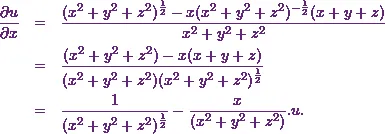First-Order Partial Derivative Of Functions With Three Variables
EXAMPLE 1
According to Stroud and Booth (2013)*
“If  express in its simplest form
express in its simplest form
![\[x\frac{\partial V}{\partial x} + y\frac{\partial V}{\partial y} + z\frac{\partial V}{\partial z}.\]](5_files/image002.webp)
SOLUTION
Here the given function is 
And, I have to find out the value of 
So I’ll start with  .
.
STEP 1
First of all, I’ll differentiate  partially
with respect to
partially
with respect to  to get
to get
![\[\frac{\partial V}{\partial x} = \frac{\partial }{\partial x}\left(x^2 + y^2 + z^2\right).\]](5_files/image008.webp)
(1) 
Next, I’ll differentiate  partially
with respect to
partially
with respect to  to get
to get
![\[\frac{\partial V}{\partial y} = \frac{\partial }{\partial y}\left(x^2 + y^2 + z^2\right).\]](5_files/image011.webp)
(2) 
Finally, I’ll differentiate  partially
with respect to
partially
with respect to  to get
to get
![\[\frac{\partial V}{\partial z} = \frac{\partial }{\partial z}\left(x^2 + y^2 + z^2\right).\]](5_files/image014.webp)
(3) 
So, now I’ll find out the value of 
STEP 2
For that, I’ll use the values of  and
and  from equations (1), (2)
and (3) respectively.
from equations (1), (2)
and (3) respectively.
Thus it will be
![\[x\cfrac{\partial V}{\partial x} + y\cfrac{\partial V}{\partial y} + z\cfrac{\partial V}{\partial z}= x. 2x + y. 2y + z. 2z.\]](5_files/image018.webp)
Therefore I get

Hence I can conclude that this is the answer to this example.
Now I’ll go to the next example.
EXAMPLE 2
According to Stroud and Booth (2013)*
“If  , show that
, show that  ”
”
SOLUTION
In this example, the given function is 
And, I have to prove that 
So I’ll start with  .
.
STEP 1
First of all, I’ll differentiate  partially
with respect to
partially
with respect to  to get
to get
![\[\frac{\partial u}{\partial x} = \frac{\partial }{\partial x}\left(\cfrac{x+y+z}{(x^2+y^2+z^2)^{\frac{1}{2}}}\right)\\= \frac{(x^2+y^2+z^2)^{\frac{1}{2}}.1-\frac{1}{2}(x^2+y^2+z^2)^{-\frac{1}{2}}(2x)(x+y+z)}{x^2+y^2+z^2}.\]](5_files/image025.webp)
Therefore I get

Thus I can say  will be
will be
In the same way I can also get the value
of  .
.
Thus  will
be
will
be
![\[\frac{\partial u}{\partial y}= \frac{1}{(x^2+y^2+z^2)^{\frac{1}{2}}}-\frac{y}{(x^2+y^2+z^2)}.u.\]](5_files/image030.webp)
Therefore I can say  will be
will be
Similarly I can also get the value
of  .
.
Thus  will
be
will
be
![\[\frac{\partial u}{\partial z}= \frac{1}{(x^2+y^2+z^2)^{\frac{1}{2}}}-\frac{z}{(x^2+y^2+z^2)}.u.\]](5_files/image034.webp)
Therefore I can say  will be
will be
So, now I’ll find out the value of 
STEP 2
For that, I’ll use the values of  and
and  from equations (4), (5)
and (6) respectively.
from equations (4), (5)
and (6) respectively.
Thus it will be

Hence I can conclude that I have proved  .
.
This is the answer to this example.


